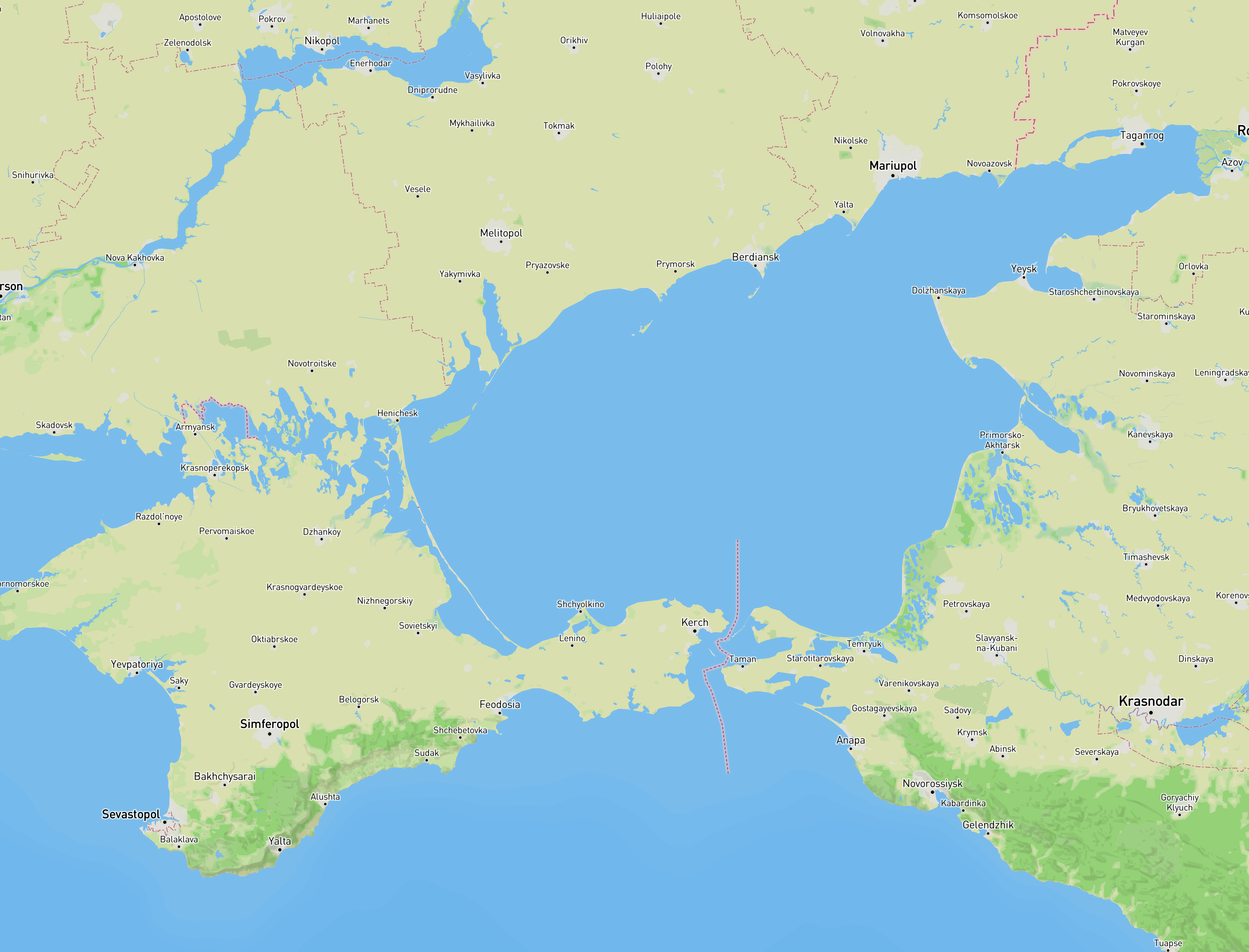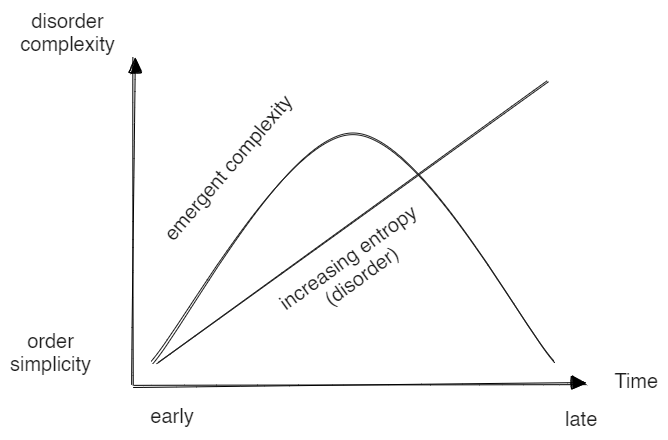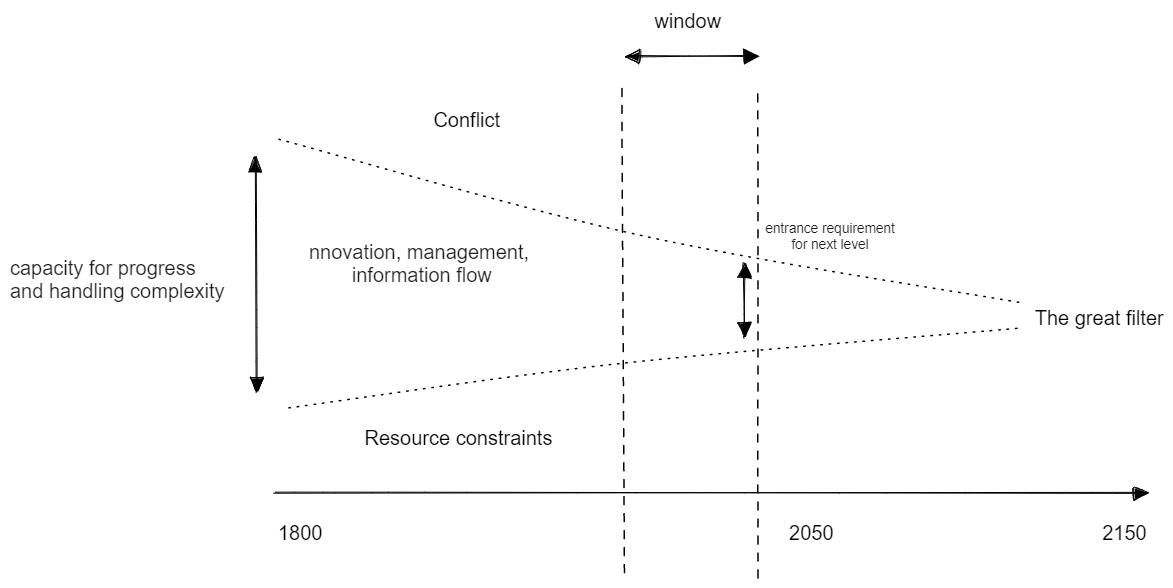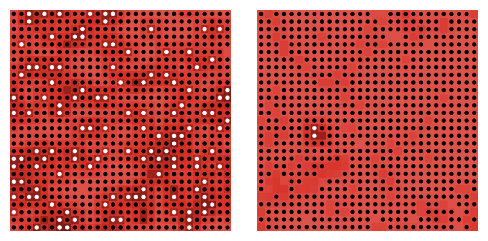The Study of Progress: An Essay on Entropy, Complexity and the Great Filter
Author: Boyan Angelov
Abstract: Numerous stumbling blocks are standing in the way of the progress of human civilization. They exist in various domains, including our environment, society and economy, and science and technology. The root cause of those issues can be traced to their complexity. The inability of humans to manage it can lead to a Great Filter event. This essay provides the context for this hypothesis based on historical and physical terms, supporting it with a humanistic and anthropocentric view, concluding with potential future perspectives.
"The fall of Empire, gentlemen, is a massive thing, however, and not easily fought. It is dictated by a rising bureaucracy, a receding initiative, a freezing of caste, a damming of curiosity—a hundred other factors. It has been going on, as I have said, for centuries, and it is too majestic and massive a movement to stop." - Hari Seldon (Foundation, I. Asimov)
Sea Change
What is progress? What is the future of human civilization? While they are the focus of my research now, such questions did not occupy my mind in the middle of the last decade of that momentous twentieth century. Due to recent historical events and my search for fundamental answers, I started to revisit my memories of that time. I believe my childhood experiences provided me with valuable context, that I am sharing here as an essay.
At that time, I used to spend every summer with my family on the shores of a little known at the time sea - the Sea of Azov (Fig. 1). In the 90s, this 30-meter-deep sea was mostly known for the Azovstal Steelworks - the largest in the Soviet Union placed on the shore. It was heavily supplied by the gargantuan coal industry several hundred kilometers to the north, in the Donbas. It was responsible for most of the steel production at the time.
Towards the latter years of my visits to this sea, a concerning phenomenon began to occur. Before it unfolded, I could see quite a significant biodiversity in the water and the beaches - small fish, shells, and crustaceans. But then, one summer, as we arrived at the beach, we saw the whole water colored dark green. At that time, this did not mean much to me - beyond the fact that we could not enter the water. After several days I remember the water cleared, but the sight was also even more disturbing - the beach was littered with dead fish. Furthermore, the summer after that, I remember there was almost no fauna in the water. Decades later, while working at the Max Planck Institute for Marine Microbiology, I understood the reason for this - the pollution from the Azovstal factory and agricultural runoff of nitrates and trace metals into the seawater.
Unfortunately, this was not the only catastrophe to befall this region of the world. After the 2012 Euromaidan protests, the Russian Federation-backed separatist forces attacked Ukraine in a first wave of attacks. Later, in 2014 Russia annexed Crimea, and finally, in 2022, a full-scale invasion.
The Sea of Azov became a site of global significance - demonstrating how a small corner of the earth can serve as an example of runaway complexity in the systems that we need to deal with - them being ecological or geopolitical - and our increasingly common shortcomings in doing so.

If we look beyond this corner of the planet, we are bound to encounter more of the same. We find ourselves in a precarious situation in the second decade of the 21st century. While there are positives in our progress, such as reduced infant mortality, escaping poverty, global vaccination, and the almost extinct threat of an AIDS epidemic - few people would assume that we live in safe, prosperous, and improving times.
Conspiracy theories are a symptom of this trend (as ominously predicted by Carl Sagan), perhaps driven by the innate human desire to know that someone is responsible, while the reality that we feel every day is that nobody is at the wheel. Multinational corporations and governments seem like abstract entities. They are rapidly losing the trust of the population at large, as recent swings towards right-wing and autocratic forms of government worldwide can attest to. This lack of trust in our institutions and fading optimism for the future are the tip of the iceberg of challenges facing us and the following generation. We see looming issues across all areas of importance to progress:
- Our environment: pollution, deforestation, biodiversity loss, loss of agricultural yield, antibiotics no longer working; all these issues pale in comparison with the one that can cripple our whole planet - climate change. Climate scientists have been seen as alarmists for decades, but the evidence has since become indisputable. 2023 will be the hottest year on record yet again after beating the previous record set just several years earlier. Antarctic ice recedes in the winter for the first time, and there is little left in the Arctic in the summer. Unpredictable weather, changing ocean currents - we start to see positive feedback loops everywhere.
- Our society and economy: political issues such as isolationism, far-right movements, growing polarization, a new European war. Economic ones such as rising inflation, energy crisis, instability of financial markets, and the growing gap between rich and poor.
- Our science and technology: the rise of AI in automation, nuclear weapons proliferation, and the potential for engineered viruses. There is concern that we are approaching a plateau of scientific discoveries, with the pace of new ones gradually diminishing.
Many of those domains overlap; for example, the effects of climate change in one area in the world lead to higher reliance on a resource (i.e., grain import), which in turn is affected by a conflict (the war in Ukraine), which is also affected by political sentiment in the United States.
Main hypothesis and definitions
I attempted to reason about the root cause of all of those issues. The result is the central hypothesis of this essay:
The main challenge facing human civilization on the way to its progress through the 21st century is the exponentially growing complexity of the systems we need to design and manage.
I attempt to be as specific as possible - even if the topic is this broad. Still, there are several terms in this statement that can be too open to interpretation, so let me unpack them.
What Is Progress?
The word progress is closely associated with the words “change”, “positive,” and “time”. We can use those together to define progress as a positive change over a period of time. The only remaining word to define from this definition is “positive” itself. It can be seen as a vague value judgement; is it quantifiable, or mostly of qualitative nature?
To answer this we can look at the numerous measurable indicators of progress, such as poverty and literacy rates, life expectancy, access to water and sanitation, and human development indices. They are all mostly overshadowed by the most widely cited one: GDP. It has been seen as a de facto proxy of human civilization's progress over the last decades after the Second World War. But does simple economic growth correspond to a modern and useful definition or progress?
In Western societies, we see a rise in postmaterialism. Still, we cannot assume that we will have a singular indicator for progress worldwide (societies in BRICS countries also expect to have the same trajectory through consumerism as the already developed ones). Also, similarly to the questions as to the ethical use of self-driving vehicles, different cultures would have different requirements. Finally, we will need a combination of those indicators to get the whole picture. All of those are arguments for designing a new, measurable definition of progress for different world regions (we cannot expect a world government - we need some kind of global control and, at the same time, local responsibility - perhaps more like the school system in federatively organized Germany. Also, accelerationism might provide a solution, but at what cost?).
What Is Complexity?
The next term that we need to define is complexity. If we look up the word in the Oxford English Dictionary, you will come the following definition:
Complexity: the state of having many parts and being difficult to understand or find an answer to.
This is a helpful definition because it focuses on why complexity is a problem. Our struggle to understand the black box systems around us and their intricate inter-relationships often lead to untraceable and unforeseen consequences (think of the butterfly effect). Such complex systems can seem fragile, especially from a human perspective. Remember the havoc that the COVID-19 pandemic brought upon China's global logistic supply lines.
Complexity is not just a helpful word in discussing human civilization, but it is also a fundamental attribute of our Universe, thus a different view can be helpful. It is essential to think on that scale since it will allow us to put a specific emphasis on the potential uniqueness of human civilization on the grandest of scales\footnote{Modified from preposterousuniverse.com:

Immediately after the Big Bang, the early universe was an orderly, simple place. The disorder of the universe is constantly increasing (entropy). Broken cups do not spontaneously reassemble to their initial orderly state, and all stars will eventually die - resulting in the cold death of the universe - a state of maximum entropy where nothing ever happens again. There is a “window” where complexity emerges in the middle. Galaxies are formed, stars and planets - and life and civilizations arise. We truly live in a galactic window of opportunity. Interestingly, this is mimicked by a much closer and, unfortunately, a smaller window of opportunity for us in our present and near future.
This graph shows us that runaway complexity is potentially unavoidable. We can look at Ashby’s Law of Requisite Variety which teaches us that to understand a complex system fully, we need to have the same (or greater) innate complexity (i.e., knowledge). Thus it can seem we have just two options in front of us in designing and managing complex systems: reorganize them with long-term antifragility in mind and take maximum advantage of computation and artificial intelligence.
The Great Filter
Why is rising complexity such a problem? In his seminal paper "The Great Filter - Are We Almost Past It", Robin Hanson originated the term. It is very often used in conjunction with the Fermi paradox. This question is as relevant today as it was back then, and even before - back to the Cuban Missile Crisis of 1967. It is also exemplified by the so-called “Doomsday Clock”, which is 90 seconds before midnight at the time of writing. Are we past this filter or not? While we have arguably moved on beyond sudden extinction-level events such as all-out nuclear war, we are still threatened by relatively gradual catastrophes such as climate change. Those hide their own dangers if you remember the cautionary tale of the boiling frog. We can attempt to visualize this situation and the factors affecting it:

We do need to pick a relatively long-term scale to see the effects. The essential element here is our capacity for progress (in other words, based on my hypothesis is equivalent to our capability of handling complexity). It decreases with time, based on external forces of complexity effects, such as armed conflict, resource constraints, and others. Opposing forces to those are innovation, improved management of resources and processes, and information flows. Currently, we probably still have enough room in a window that we can meet the entrance requirements for the next level, but the critical question remains - how wide is this window, and what can we do to expand it and act today?
There are other hidden potential causes of a great filter - reduced amount of innovation (have we invented everything which is low-hanging fruit (some argue there are also non-technological innovations we should take into account), helium, phosphorus, and rare earth elements, such as terbium and dysprosium. Also, technological issues exist. Can we have large-scale air transport at scale with electricity? How about the melting of steel using renewable energy? Is that even possible?
We can also have another view if we look at the Kardashev scale and back into history. The Roman Empire (also the Incans) couldn’t handle the complexity of their civilization's growth, but are we better prepared? We can take a big history approach and attempt to visualize the complexity of human civilization through the various stages of its development. Look at Fig. 4:

We are at a fork in the road; we can either start designing our systems with complexity in mind or suffer the same fate at a great filter event (black swan or dragon king). Next, let’s take a detour into ethics.
A Humanistic and Anthropocentric Perspective
Morals and ethics are complicated territory. However, to support any solutions to my hypothesis that the number one enemy for the progress of human civilization is complexity, we need to have a moral framework - what is our place and responsibility in this universe? Progress can be seen is a moral imperative.
A common argument that can be heard is that Homo sapiens is a type of cancer on this planet - fueling exponential growth by destroying its host organism. It turns out we can test this assumption. What would a world without humans look like? This is also a fascinating mathematical model we can use to contrast how the biosphere can regulate itself in conjunction with the environment (the abiotic system) - the “daisyworld“ model. Have a look at the initial conditions in Fig. 5:

And how the situation looks after several iterations in Fig. 6:

Here we have two types of daisy flowers, black and white - with different levels of reflectivity to the sun’s rays. They have different growth rates depending on temperature, and the temperature is calculated based on the amount of energy received in difference to the energy reflected. If we run such a simulation, we get an example of negative feedback from a self-regulating system - the daisies can keep the system's temperature constant.
Here are the most critical equations, showing the simple math behind this model (reminding me of Stephen Wolfram’s Rule 30 and how complex behavior can arise from simplicity:
where
where
where
And on Fig. 7, we can see how after an initial increase, and subsequent oscillation, the temperature tends to be mostly constant.

The population graph looks a bit different, and one species paid the price to ensure the dynamic equilibrium of the system by going almost extinct (Fig. 8):

With the effects of the Anthropocene in full view, it becomes obvious that human civilization upsets this balance in nature, with the effects potentially devastating for us and resulting in a great filter event. Still, there is a big difference between us and other species. One can always argue, similar to what is progress, what is “evolutionary success”? For example, one can say that “primitive” bacteria are far more successful than our civilization simply because they have survived all types of global catastrophes (such as changing climate and asteroid impact) across billions of years. This contrasts greatly with the struggle of human civilization to regulate itself and delegate this task to the environment itself - which would probably not have our best interest at heart.
While comparison seems to hold true on a local scale, the situation changes if we look at the galactic one once again. Remember, we also have a window of opportunity in the universe at large - a Goldilocks zone where complexity and entropy are in exactly the right amounts and distribution. The fate of all bacteria on planet Earth is already pre-determined - they will perish in 1.5 billion years when the expanding and dying sun engulfs the earth in flames. The human species is both cancer and savior - we are the only ones that can proliferate life (and emerging complexity) across the universe and potentially give rise to abiotic emerging complexity - artificial life. We will be able to invent new species soon; the only important thing is to ensure human civilization's long-term survival and progress. We are the only species to tip the balance and destroy life, but also the only one to spread it long-term.
Such a view contrasts starkly with the opinion of people I hold in the highest regard, such as Carl Sagan:
“If Mars is inhabited, then our moral situation is clear: We must cherish the Martians as a precious cosmic resource. They have a right to their planet. We must explore Mars only with their consent. If they do not exist, then we have an obligation to our descendants to preserve Mars as a world of wonder and beauty, a place where humans can someday live without doing violence to the environment that gave them birth.” --- Carl Sagan (Cosmos)
I disagree; while life is probably common across the Universe, intelligent life may not be. It is our purpose to proliferate life and complexity. Of course, there are dangers in such a view - anthropocentrism and blind attempts at the dominance of man over matter and nature have been the cause of many of the issues I covered at the beginning of this essay. This is also illustrated in cautionary tales such as Jurassic Park - our attempts at controlling complex systems can often bring the worst results.
Perspectives
The enemy of progress is complexity. We have a limited window of opportunity - not only on a civilization scale but also in the context of the Universe. My goal was to state this and not to go into solutions, but there are some avenues we can explore in the spirit of solutionism:
- We must define progress globally and locally - beyond consumerist and neo-liberalist metrics such as GDP.
- We need to reduce the long-term risk of going below the filter by paying the price now and designing distributed, antifragile, and self-regulating systems from a civilization-first, humanistic, and anthropocentric view first.
- We need a new science of progress that allows us to experiment and measure the results of such experiments based on cybernetic principles and language.
Autocratic, command, and control centralized systems are fragile and will betray us in the face of exponential runaway complexity (as the current Russo-Ukrainian War also demonstrates). The time is gone for such ways to design and manage systems that we control and interact with.
In Foundation, the cracks of the Empire begin to show, with cascading effects eventually. We might be already there, and irreversible trends can be squeezing us below thee boundary that we need to pass the great filter. Still, we can pay the price now and start to work on solutions to avoid that fate, and stories such as mine from the Sea of Azov remain isolated, and we witness Fukuyama's “End of History”. Maybe we are at the edge of a new chance for organized matter to spread, even if it is inorganic (AI) - a new meta-evolution.
Let us end with Asimov's words once again:
"The future is a black void in which, to my knowledge, we are the only flickering light." --- Hari Seldon (Foundation, I. Asimov)